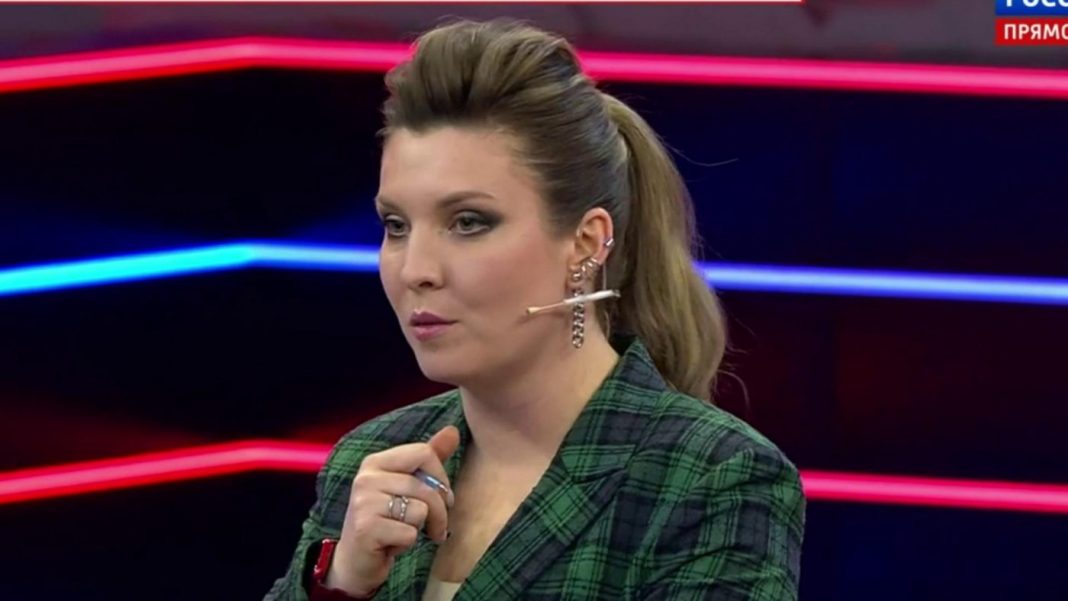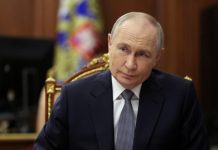Bu Julia Davis, for CEPA
Russian propagandists believe some US politicians are seeking to weaken Ukraine’s hand in its war for national survival.
House Speaker Mike Johnson visited ex-President Donald Trump at his Mar-a-Lago resort in Florida on April 12, purportedly to present a new Republican “election integrity” bill.
But pundits and experts on Russian state television watched Johnson’s pilgrimage with very different expectations. Appearing on that night’s broadcast of the flagship state TV show 60 Minutes, Dmitry Abzalov, Director of the Center for Strategic Communications, described it as “the most important day.”
He explained that Johnson’s trip would decide the future of US aid for Ukraine. A $95bn supplemental aid package, mostly for Kyiv, is stalled in the House of Representatives because Johnson has so far refused to allow a vote, seemingly at Trump’s behest. Its passage would be a serious setback for Russia.
Russia’s top propagandists have argued Russia has a friend in Johnson since his election as Speaker in October. At the time, 60 Minutes host Olga Skabeeva was thrilled.
She stated: “Johnson is not only an extreme-right Trump supporter, [he] always voted against aid to Ukraine and made corresponding statements that were considered to be anti-Ukrainian . . . Where Ukraine is concerned, it’s sufficient to look at Johnson’s ratings with respect to his support of Ukraine. His rating is very poor! This means that all of this suits us well.”
Skabeeva proceeded to make a prediction as to what Johnson would do: “With a Trump fanatic as speaker, the bill . . . that was proposed by Biden definitely will not pass. Johnson will simply not put it up for a vote!”
Apparently pleased with Johnson, Skabeeva described him as “our Johnson” — not to be confused with Boris Johnson, the former British Prime Minister. This description was reminiscent of the way Trump is routinely described on state television as “our Trump” or Trumpushka.
The problem for the Kremlin’s mouthpieces is that their reading of US domestic politics is driven by hope. While Skabeeva was right to identify Johnson’s largely anti-Ukraine voting record, his current thinking is elusive. Some on the far-right accuse him of changing his mind on Ukraine, and he has been saying there will be a vote on the aid package.
Even so, many in the US pro-Ukraine camp are deeply skeptical of his intentions and furious that his actions to date have benefitted the Kremlin. The military situation is already deteriorating — Ukraine will be outgunned 10-1 in the coming weeks without an influx of arms, according to the most senior US general in Europe.
Russia’s military likely assesses delays to US aid, or its termination, mean: “Ukrainian forces will be unable to defend against current and future Russian offensive operations,” according to the Institute for the Study of War on April 13.
Although propagandists are poor predictors of international events, they can offer insights into their regime’s thinking. Of course, they spread untruths and distortions, but they also have a license to truthfully explain what’s in the Kremlin’s heart. And they know of what they speak — senior government officials regularly meet state-funded journalists and issue “lines to take” on current events.
This use of mouthpieces to signal the regime’s true feelings was visible when Putin said in a February 14 interview he hoped Joe Biden would win re-election. This attempt to feign a preference for the current president was met with open smirks by his state media talking heads. Multiple experts explained on state television that this was merely a jab designed to hurt Biden.
American aid to Ukraine is in doubt, and excited Russian propagandists cherish the prospect of Trump’s return to office. Some even predict that the US will be ruled by a Trump dynasty for decades to come.
Russia’s preference for the Trump-controlled Republicans has been made abundantly clear, and efforts to infect Republican leaders and voters with Russian propaganda were openly discussed on state television in 2021 before Putin’s full-fledged invasion of Ukraine.
Russian state media remains an extremely good predictor of what the Kremlin really intends. Even as many in the West and in Ukraine doubted intelligence warnings of the February 2022 all-out invasion, Moscow’s mouthpieces were happily predicting it. The tactic of destroying Ukraine’s infrastructure to “plunge Ukraine into darkness” and drive 20 million Ukrainian refugees to Europe was likewise openly discussed and continues to unfold. Likewise, the mass murder of Ukrainians was openly promoted and is being carried out.
Russia’s tactic is not unlike the Zodiac killer’s letters to the police — a desire to boast about its own crimes while at the same time concealing its true nature and identity.
A clearly imperialist Moscow poses as a fighter against Western imperialism, while Putin’s oppressive regime tells gullible Westerners that they are the ones being oppressed at home — and that opposing US aid to Ukraine is an assertion of their liberty.
The Kremlin’s propagandists routinely explain that the best way to destroy the West is from within, by undermining its principles and compromising its vital alliances. And, they explain, there is more to come. As Putin’s mouthpieces routinely say: “Ukraine is just the beginning.”
Julia Davis is a columnist for The Daily Beast and the creator of the Russian Media Monitor. She is a member of the Academy of Television Arts and Sciences, the Screen Actors Guild, and Women In Film.
Europe’s Edge is CEPA’s online journal covering critical topics on the foreign policy docket across Europe and North America. All opinions are those of the author and do not necessarily represent the position or views of the institutions they represent or the Center for European Policy Analysis.





